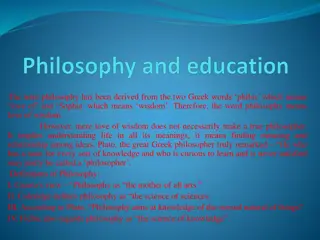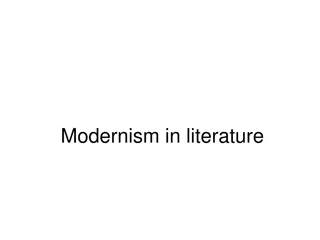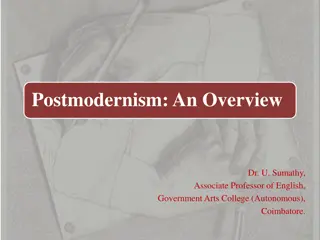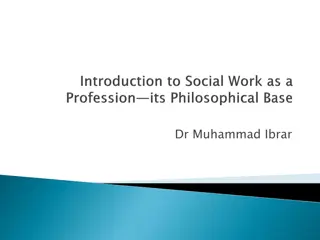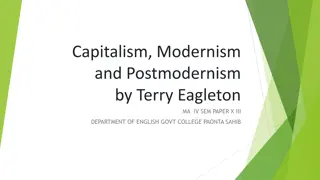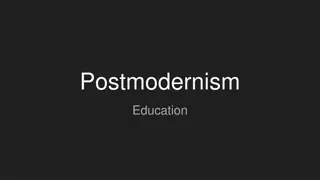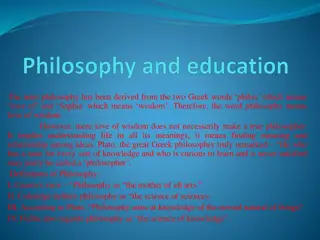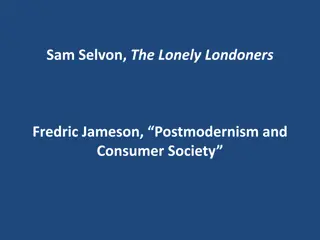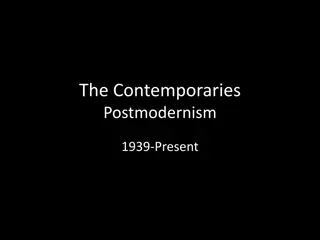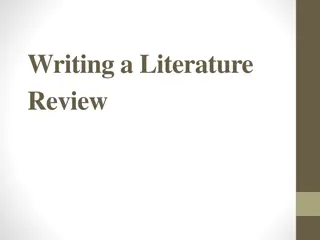Exploring Postmodernism: Art, Literature, and Philosophy
Postmodernism challenges traditional beliefs about language, identity, and reality. It is characterized by skepticism, subjectivism, and a critical view of ideology in politics and economics. Key thinkers like Thomas Pynchon, Donald Barthelme, and Jean-François Lyotard have contributed to shaping this late 20th-century movement. Concepts such as hyperreality, simulacrum, and deconstruction by thinkers like Jean Baudrillard and Jacques Derrida are central to understanding postmodernism's impact on various fields.
Download Presentation

Please find below an Image/Link to download the presentation.
The content on the website is provided AS IS for your information and personal use only. It may not be sold, licensed, or shared on other websites without obtaining consent from the author. Download presentation by click this link. If you encounter any issues during the download, it is possible that the publisher has removed the file from their server.
E N D
Presentation Transcript
Glass Mountain Donald Barthelme 1 I was trying to climb the glass mountain. 2 The glass mountain stands at the corner of Thirteenth Street and Eighth Avenue. 3 I had attained the lower slope. 4 People were looking up at me.
5 I was new in the neighbourhood. 6 I had acquaintances. 7 I had strapped climbing irons to my feet and each hand grasped a sturdy plumber s friend
8 I was 200 feet up. 9 The wind was bitter. 10 My acquaintances had gathered at the bottom of the mountain to offer encouragement. 11 Shithead
Thomas Pynchon The Crying of Lot 49 (1996) Oedipa Maas, California housewife Unravel the mystery of a powerful secret organization that may or may not have existed Novel ends at the point of discovery
What is Postmodernism? Something that unsettles, and deconstructs traditional notions about language, identity, writing itself, and so on
A late 20th-century movement characterized by 1. broad skepticism 2. Subjectivism 3. a general suspicion of reason 4. an acute sensitivity to the role of ideology in asserting and maintaining political and economic power.
The term postmodernism first entered the philosophical lexicon in 1979, with the publication of The Postmodern Condition by Jean-Fran ois Lyotard Hyperreality is closely related to the concept of the simulacrum: a copy or image without reference to an original. hyperreality is the result of the technological mediation of experience, where what passes for reality is a network of images and signs without an external referent, such that what is represented is representation itself. Jean Baudrillard
Derrida Deconstruction - Of Grammatology No centre diff rance - a device that can only be read and not heard when diff rance and diff rence are pronounced in French
Postmodernism Reason and Science are myths created by man; mere Ideologies No objective, reliable foundation of knowledge No universal, objective means of judging any given concept as true ; ALL judgments of truth exist within a cultural context (cultural relativism).
Science is neither universal, nor it is better than any other culture s definition of truth Independence/Freedom are Western Ideologies (just like reason and science) used to colonize foreign cultures or subjugate women
no eternal truths, no universal human experience, no universal human rights, overriding narrative of human progress Language is fluid and arbitrary and/or rooted in Power/Knowledge relations. Meaning is fluid and arbitrary. Meaning is messy . There is no objective means upon which to predicate morality and right/just governance. Postmodern theory is descriptive of the human condition; it describes an impasse in philosophy and social relations.
The categories male/female, masculine/feminine are themselves culturally constructed and/or Ideology. Gender roles are culturally relative in all cultures and contexts. self is a myth and largely a composite of one s social experiences and cultural contexts. The "self" is an Ideology.
meta-narrative Jean Francois Lyotard It means a story or narrative that is presumed to have great generality and represents a final truth. Modernists believe in metanarratives whereas postmoderns are incredulous of metanarratives. Postmoderns, in this sense of the term, are eclectic and gather their beliefs from a variety of sources while treating the resulting compilation as tentative. (Mininarratives)
Deletion of boundary between art and life Deletion of boundary between Classical art and Popular art Pastiche: Imitation of dead styles Schizophrenia: Fragmentation of Time Disillusionment
MODERNISM & POSTMODERNISM 1. M: Form (Conjunctive, Closed) PM: Antiform (Disjunctive, Open) 2. M: Purpose PM: Play
3. M: Transcendence PM: Immanence 4. M: Determinacy PM: Indeterminacy
5. M: Centering PM: Dispersal 6. M:Root/Depth PM: Rhizome/Surface 7. M: Interpretation/Reading PM: Against Interpretation/Misreading
8. M: Selection PM: Combination 9. M: Narrative PM: Anti-narrative 10. M: Origin/Cause PM: Difference-Differance/Trace
11. M: Art Object/Finished Work PM: Process/Performance/Happening 12. M: Design PM: Chance 13. M: Genre/Boundary PM: Text/Intertext
Key Concepts Simulacra A simulacra is a copy of a copy, so far removed from its original, that it can stand on its own and even replace the original. Term defined by Jean Baudrillard in "The Precession of Simulacra" from Simulacra and Simulation "It is the generation by models of a real without origin or reality: a hyperreal.... substituting the signs of the real for the real".
Hyperreality Hyperreality is a symptom of postmodern culture where a person loses their ability to distinguish reality from fantasy. The hyperreal world is often thought of as an idealized enhancement of reality, much preferable to the real life equivalent. Present day examples could include reality television, pornography, or multi- player online games.
Aporia An aporia is a philosophical puzzle, paradox, or impasse often used in conjunction with 'deconstruction'. A state of wonder and awe due to contemplating the mysteries of life and the universe. An internal contradiction in a statement or theory Literal translation from Greek is 'without passage
Flattening of Affect Flattening of affect is a scientific term describing a person's detachment and lack of emotional reactivity. Used in the postmodern literature to describe technology's dehumanizing impact.
Panopticon Panopticon is derived from the Greek opticon (see) and pan (all). A type of prison designed to allow the guards to observe all prisoners without their knowledge. The goal is to convey a feeling of "invisible omniscience" over the minds of the prisoners. The panopticon is a symbol in many dystopian novels, most notably George Orwell's 1984
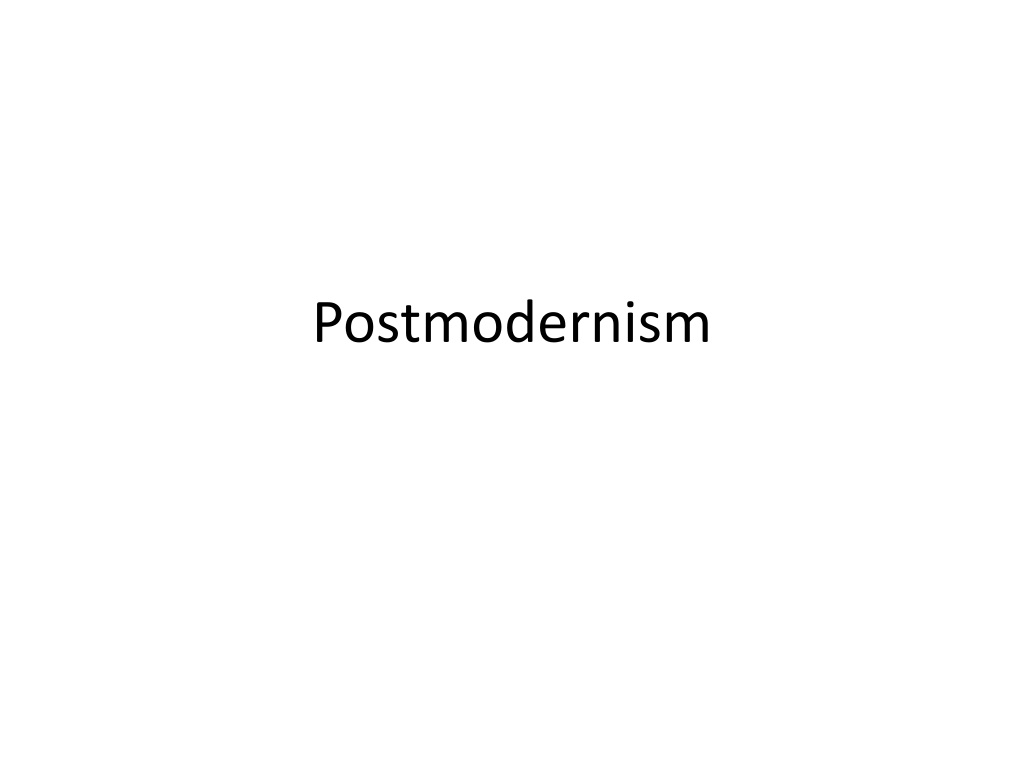

![[PDF⚡READ❤ONLINE] In Ruins: A Journey Through History, Art, and Literature](/thumb/20543/pdf-read-online-in-ruins-a-journey-through-history-art-and-literature.jpg)

